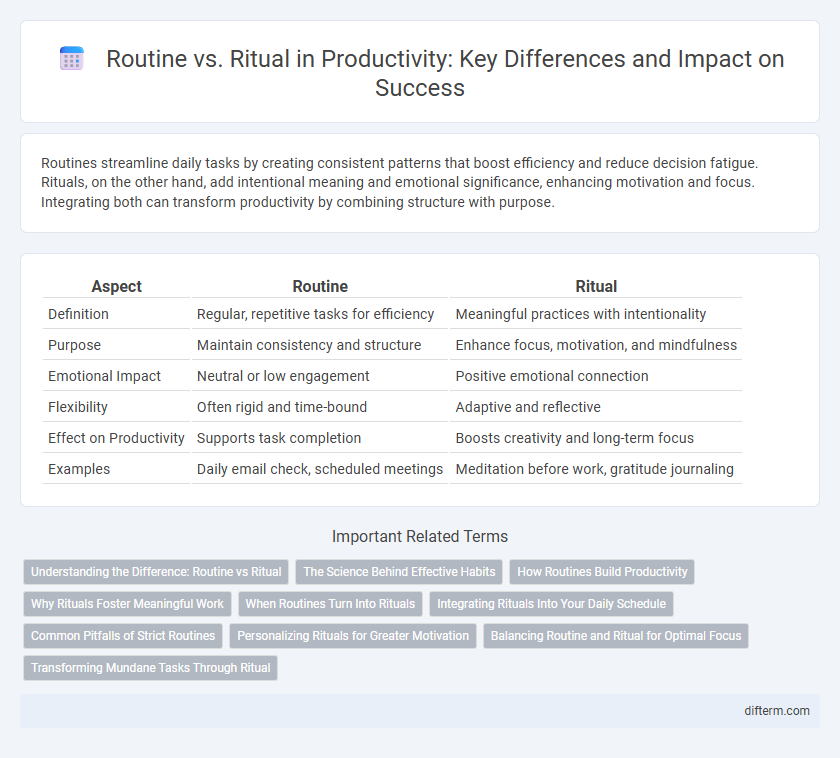Routines streamline daily tasks by creating consistent patterns that boost efficiency and reduce decision fatigue. Rituals, on the other hand, add intentional meaning and emotional significance, enhancing motivation and focus. Integrating both can transform productivity by combining structure with purpose.
Table of Comparison
| Aspect | Routine | Ritual |
|---|---|---|
| Definition | Regular, repetitive tasks for efficiency | Meaningful practices with intentionality |
| Purpose | Maintain consistency and structure | Enhance focus, motivation, and mindfulness |
| Emotional Impact | Neutral or low engagement | Positive emotional connection |
| Flexibility | Often rigid and time-bound | Adaptive and reflective |
| Effect on Productivity | Supports task completion | Boosts creativity and long-term focus |
| Examples | Daily email check, scheduled meetings | Meditation before work, gratitude journaling |
Understanding the Difference: Routine vs Ritual
Routines are structured sequences of actions performed regularly to achieve specific productivity goals, emphasizing efficiency and consistency. Rituals, however, infuse meaning and intention into these actions, often involving symbolic behavior that fosters mindfulness and motivation. Distinguishing between routine and ritual enhances the ability to design daily practices that not only streamline tasks but also enrich mental focus and emotional well-being.
The Science Behind Effective Habits
Effective habits are rooted in the brain's neurological pathways, where routines trigger automatic behaviors through repetitive practice, strengthening neural connections. Rituals, by contrast, incorporate intentional meaning and emotional significance, activating the brain's reward system and enhancing motivation. Scientific studies show that combining consistent routines with mindful rituals optimizes habit formation, leading to sustained productivity and improved cognitive function.
How Routines Build Productivity
Routines build productivity by creating consistent patterns of behavior that reduce decision fatigue and increase efficiency. Establishing specific daily habits automates tasks, allowing the brain to conserve energy for more complex work. This structured repetition strengthens discipline and enhances time management, leading to sustained performance growth.
Why Rituals Foster Meaningful Work
Rituals foster meaningful work by creating consistent frameworks that enhance focus and intention, enabling deeper engagement with tasks. Unlike routines, rituals integrate personal significance and emotional resonance, which increase motivation and satisfaction. This connection between action and purpose strengthens productivity by promoting sustained commitment and a sense of achievement.
When Routines Turn Into Rituals
When routines evolve into rituals, they transcend mere habit and become meaningful practices that enhance productivity and well-being. Rituals engage both the mind and body, fostering consistency and a sense of purpose that routines often lack. This transformation can lead to increased motivation, improved focus, and sustained energy throughout the workday.
Integrating Rituals Into Your Daily Schedule
Integrating rituals into your daily schedule enhances productivity by creating consistent patterns that reinforce positive habits and reduce decision fatigue. Unlike routines, rituals carry symbolic meaning that boosts motivation and emotional engagement, making tasks feel more purposeful. Scheduling small, intentional rituals--such as morning mindfulness or brief gratitude pauses--can increase focus and sustain energy throughout the day.
Common Pitfalls of Strict Routines
Strict routines often lead to rigidity, causing burnout and decreased motivation due to lack of flexibility. Overemphasis on exact timing can create stress when unexpected events disrupt the schedule. Incorporating adaptable rituals instead fosters sustained productivity by balancing structure with personal well-being.
Personalizing Rituals for Greater Motivation
Personalizing rituals enhances motivation by aligning daily habits with individual values and goals, creating meaningful and consistent engagement. Unlike generic routines, personalized rituals tap into emotional and psychological triggers that boost focus and productivity. Tailoring rituals to personal preferences transforms repetitive tasks into inspiring practices that sustain long-term commitment.
Balancing Routine and Ritual for Optimal Focus
Balancing routine and ritual enhances productivity by combining structured habits with meaningful actions that boost focus and motivation. Routines provide consistency and efficiency in daily tasks, while rituals add intentionality and mental clarity, reducing cognitive fatigue. Integrating both allows for sustained attention and improved task performance.
Transforming Mundane Tasks Through Ritual
Transforming mundane tasks into rituals enhances productivity by infusing purpose and intentionality into daily routines. Rituals engage the brain's reward system, increasing motivation and focus while reducing the perception of effort. Establishing consistent rituals around repetitive tasks can create positive neural pathways that make those activities more enjoyable and efficient.
routine vs ritual Infographic

 difterm.com
difterm.com